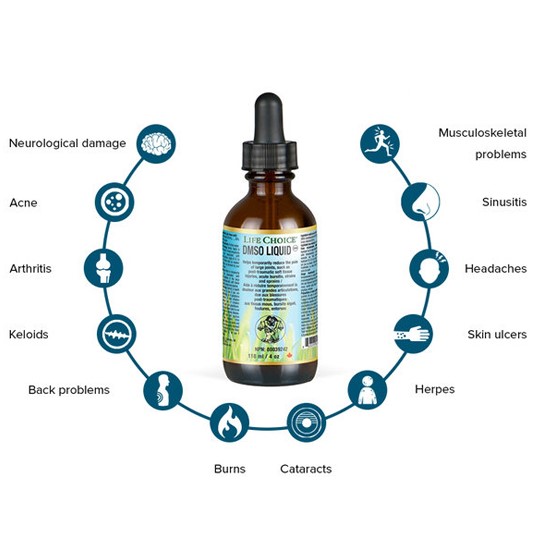Dimethyl sulfoxide (DMSO) and methylsulfonylmethane (MSM) are two compounds that have sparked interest in the health and wellness community for their purported benefits. Both substances share a sulfur component, which is vital for their biological activities and therapeutic potentials. Despite their similar chemical makeup, DMSO and MSM serve different functions in medical and health applications, leading to confusion about their uses and benefits.
The key difference between DMSO and MSM lies in their application and safety profile. DMSO is primarily used as a solvent and pharmaceutical agent with notable anti-inflammatory and analgesic properties, whereas MSM is widely consumed as a dietary supplement to support joint health, reduce inflammation, and enhance immunity. Their distinct chemical structures and mechanisms of action account for their varied uses in health and wellness.
DMSO and MSM have been the subject of numerous studies aiming to uncover their health benefits, safety, and mechanisms of action. DMSO’s ability to penetrate biological membranes makes it a valuable carrier for pharmaceuticals, while MSM’s role in sulfur metabolism contributes to its anti-inflammatory and antioxidant effects. Understanding these compounds’ unique properties and health implications can guide consumers in making informed decisions about their use.

Origins and Chemistry
DMSO Overview
Discovery and Chemical Properties
Dimethyl sulfoxide (DMSO) emerged in the mid-19th century but its therapeutic potential was not recognized until the 1960s. A byproduct of wood processing, DMSO is an organosulfur compound with the formula (CH₃)₂SO. This colorless liquid is known for its ability to dissolve both polar and nonpolar compounds, making it exceptionally versatile as a solvent. The key feature of DMSO is its remarkable ability to penetrate the skin and other membranes without damaging them, facilitating the absorption of other compounds.
MSM Overview
Natural Occurrence and Chemical Structure
Methylsulfonylmethane (MSM), with the chemical formula (CH₃)₂SO₂, is a natural sulfur compound found in many plants and animals. MSM is known for its beneficial effects on health, particularly for joint health and immune function. Unlike DMSO, MSM is a stable, odorless, and tasteless white crystalline powder that is water-soluble. Its role in nature includes being a primary source of sulfur in the sulfur cycle, an essential element for life.
Key Differences
Comparison of Chemical and Physical Properties
The primary distinction between DMSO and MSM lies in their chemical and physical properties. DMSO is a liquid at room temperature, with a high boiling point and excellent solvent capabilities. MSM, in contrast, is a solid crystalline substance that is often used in powdered form as a dietary supplement. Chemically, DMSO has one sulfur atom bonded to two methyl groups and an oxygen atom, whereas MSM contains two oxygen atoms connected to the sulfur, making it more oxidized than DMSO.
Health Benefits
DMSO Uses
Medical and Therapeutic Applications
DMSO’s unique properties have led to its use in various medical applications:
- Pain relief: Acts as an analgesic by reducing pain and inflammation.
- Anti-inflammatory: Helps in reducing swelling and inflammation.
- Carrier for medications: Enhances the delivery of other drugs through the skin.
Its ability to penetrate tissues deeply without causing damage is why it’s valued in treating conditions like interstitial cystitis, rheumatoid arthritis, and skin inflammations.
MSM Benefits
Role in Joint Health, Inflammation, and Immunity
MSM is primarily known for its benefits in:
- Supporting joint health: Provides sulfur necessary for forming connective tissue, improving joint flexibility and reducing pain.
- Reducing inflammation: Exhibits anti-inflammatory properties that help in managing conditions like arthritis.
- Boosting immunity: Sulfur plays a crucial role in immune function, and MSM supplementation can help in enhancing the body’s defense mechanisms.
Comparative Analysis
Side-by-side Benefits of DMSO and MSM
When comparing DMSO and MSM, it’s evident that while both share sulfur as a significant component and have anti-inflammatory properties, their applications and benefits diverge. DMSO is more geared towards topical and medical uses, acting as a potent analgesic and anti-inflammatory agent. In contrast, MSM serves as a nutritional supplement with a broader impact on overall health, especially for joint health, reducing inflammation, and boosting the immune system.
Safety and Side Effects
DMSO Considerations
Potential Risks and FDA Status
While DMSO is approved by the FDA for limited medical conditions, such as interstitial cystitis, its use is accompanied by potential side effects:
- Skin irritation and rashes
- Dryness and itching
- Garlic-like taste and odor
It’s important to use DMSO under the guidance of a healthcare professional to mitigate these risks.
MSM Safety Profile
Known Side Effects and Recommended Dosages
MSM is considered safe for most people when taken orally and within recommended dosages, typically up to 3 grams daily. Side effects are rare but may include:
- Nausea
- Diarrhea
- Headaches
Adhering to the recommended dosages is crucial to avoid any adverse effects.
Making the Right Choice
Factors to Consider for Personal Use
Selecting between DMSO and MSM involves considering several factors:
- Intended use: Whether the need is for topical application or dietary supplementation.
- Safety profile: Understanding each compound’s side effects and interactions.
- Consultation with healthcare providers: Seeking professional advice based on individual health conditions and needs.
Both DMSO and MSM offer distinct health benefits and come with specific considerations for their use. Informing oneself and consulting with healthcare professionals can guide individuals in making the best choice for their health and wellness goals.

Application Methods
DMSO Administration
Common Forms and Methods of Application
DMSO is available in several forms, including liquid, gel, and cream. Its application method depends on the intended use and the area of treatment. Here’s how to use DMSO safely:
- Topical application: Apply DMSO directly to the skin over the affected area. It’s crucial to ensure the skin is clean to prevent transporting any contaminants into the body.
- As a solvent: DMSO can dissolve medications for topical application, enhancing their absorption through the skin.
- Safety precautions: Use gloves when applying DMSO to avoid skin irritation and ensure the DMSO concentration is suitable for human use, typically below 70%.
MSM Usage
Varieties of MSM Products and Optimal Usage
MSM is available in various forms, including capsules, powder, and topical creams. Here are tips for optimal usage:
- Oral supplements: Capsules or powder can be taken with water, preferably with meals to enhance absorption.
- Topical applications: MSM creams can be applied to the skin to reduce inflammation and pain in specific areas.
- Dosage: Follow the recommended dosage on the product label or consult a healthcare provider to determine the appropriate amount for your needs.
Practical Tips
Maximizing Benefits While Minimizing Risks
To derive the maximum benefits from DMSO and MSM while minimizing risks, consider the following guidelines:
- Start with a low dose and gradually increase to gauge tolerance.
- Consult healthcare professionals before starting any new supplement, especially if you have pre-existing conditions or are taking other medications.
- Quality matters: Choose products from reputable manufacturers to ensure purity and effectiveness.
Scientific Research
Studies on DMSO
Overview of Landmark Research Findings
Research on DMSO has highlighted its therapeutic potential in various fields:
- Pain management and inflammation: Studies have shown DMSO’s effectiveness in reducing pain and inflammation in conditions like arthritis.
- Skin and tissue penetration: Its ability to penetrate skin without damaging tissues makes it valuable for delivering drugs topically.
MSM Research Highlights
Recent Studies and Their Implications
Recent studies on MSM have focused on its health benefits, particularly for joint health:
- Osteoarthritis relief: Clinical trials have demonstrated MSM’s effectiveness in reducing pain and improving joint function in osteoarthritis patients.
- Anti-inflammatory properties: Research supports MSM’s role in reducing inflammation, potentially benefiting conditions beyond joint health.
Comparative Insights
What Research Says About Efficacy and Safety
Comparing DMSO and MSM, research indicates both have unique benefits with a good safety profile when used correctly. DMSO’s research has been more focused on its topical applications and solvent properties, while MSM studies highlight its systemic benefits for joint health and inflammation.
Consumer Guide
Choosing Quality Products
Identifying High-quality DMSO and MSM
To ensure you’re getting high-quality products, look for:
- Purity: Choose products with a high purity level, especially for DMSO, to avoid skin irritation.
- Certifications: Look for certifications from independent testing organizations.
- Reputable brands: Purchase from well-known brands with positive reviews and transparency about their sourcing and manufacturing processes.
Dosage and Timing
Guidelines for Effective Use
Effective use of DMSO and MSM depends on correct dosage and timing:
- DMSO: For topical use, a lower concentration is often sufficient. It should be applied 1-2 times daily, based on the condition being treated.
- MSM: Typical daily dosages range from 1,000 to 3,000 mg, taken in divided doses with meals to enhance absorption.
Long-term Use
Considerations for Chronic Conditions
For individuals considering long-term use of DMSO or MSM for chronic conditions:
- Monitor for side effects: Regularly evaluate for any adverse effects over time.
- Consult regularly with healthcare providers to adjust dosages as needed and ensure the supplement remains beneficial.
Industry Perspectives
Market Trends
Popularity and Availability of DMSO and MSM Products
The market for DMSO and MSM has grown, reflecting their increasing popularity among consumers seeking natural health remedies. With this growth, products have become more widely available through online retailers, health food stores, and pharmacies.
Expert Opinions
What Health Professionals Say
Health professionals recognize the benefits of DMSO and MSM but emphasize the importance of using these compounds responsibly and judiciously. They advocate for informed decision-making based on current research and individual health needs, highlighting the necessity of consulting healthcare providers before starting new supplements.
Frequently Asked Questions
What is DMSO used for?
DMSO is primarily used as a prescription medication for its anti-inflammatory and analgesic properties, particularly in treating interstitial cystitis. Its ability to penetrate the skin also makes it useful in delivering other medications topically. In the laboratory, DMSO serves as an important solvent for chemical reactions and sample preparation due to its unique dissolving capabilities.
Can MSM improve joint health?
Yes, MSM is widely recognized for its beneficial effects on joint health. It provides sulfur, which is crucial for the maintenance of healthy connective tissue, cartilage, and joints. Regular supplementation with MSM can help reduce joint inflammation, improve flexibility, and alleviate pain associated with conditions like osteoarthritis.
Are DMSO and MSM safe to use?
DMSO and MSM are generally considered safe for most people when used appropriately. DMSO can cause skin irritation and should be used under medical supervision. MSM is well-tolerated as a dietary supplement, with few reported side effects at recommended doses. However, individuals should consult healthcare professionals before starting any new supplement or treatment.
How do DMSO and MSM differ chemically?
Chemically, DMSO (C2H6OS) is an organosulfur compound with a unique ability to penetrate biological membranes, while MSM (CH3SO2CH3) is an organic sulfur compound that occurs naturally in some plants and animals. The key difference lies in their molecular structure, which determines their solubility, biological availability, and therapeutic uses.
Conclusion
DMSO and MSM offer a fascinating glimpse into the world of sulfur-containing compounds and their role in health and medicine. While DMSO has found its niche in medical treatments and laboratory applications due to its powerful solvency and transdermal delivery properties, MSM shines as a dietary supplement beloved for its support of joint health, immune function, and anti-inflammatory benefits.
Choosing between DMSO and MSM depends on individual health needs, preferences, and professional guidance. With their unique properties and benefits, both compounds stand as valuable tools in the pursuit of well-being, highlighting the importance of informed choice in health supplements and treatments.

